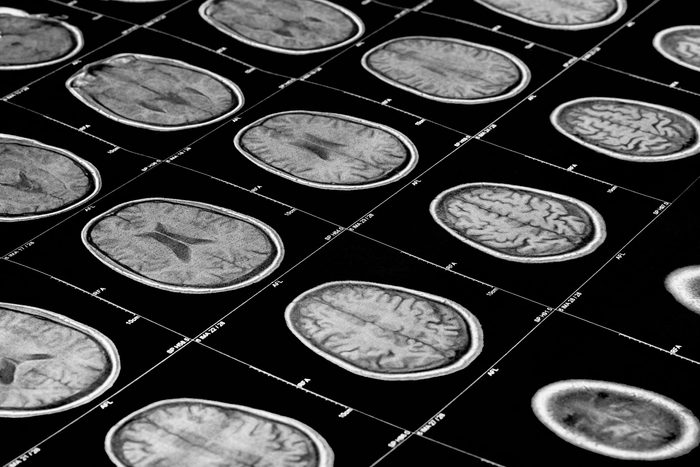
Why is autism still so confusing?
Since 1999, the puzzle piece ribbon has represented the Autism Society, a symbol of the neurological disorder’s complexity. “Autism may be confusing to both ordinary people and professionals because some of its behavioural characteristics remind those of other, more common and better-described conditions, such as ADHD, anxiety, depression, obsessive-compulsive disorder, and oppositional defiant disorder,” explains Oksana Hagerty, PhD, a developmental psychologist at Beacon College in Leesburg, Florida.
Newer brain research has moved from how we process concrete concepts like math and language to how the brain manages with more abstract concepts that play a role in autism—such as social and emotional intelligence. As neurologists gain a better understanding of the brain, they’re able to debunk more and more myths about autism. These are the outdated beliefs doctors wish people would stop believing.

Myth: Individuals with autism are emotionless
Some people assume that autism leaves a person incapable of experiencing true emotions. But autism is a spectrum disorder, and people may express a range of emotions from excitement to anger, whereas others are more restricted in their expression. But individuals with autism can undoubtedly recognize, and feel emotions from others, regardless of how they express it.
According to an article in Pediatric Health, Medicine, and Therapeutics, most children with autism are able to recognize emotions comparable to their same-age peers by matching them. They can often label simpler feelings, like happiness and sadness, though they can struggle to identify emotions like surprise and fear, explains Tamara Bugembe, MD, a consultant pediatrician.

Myth: They prefer to stay isolated
It’s no secret that social impairments affect individuals on the autism spectrum. Those on the spectrum may find it difficult to develop relationships with their peers due to a combination of a delayed ability for spontaneous sharing, communication delays, and impaired ability to recognize subtleties in facial expressions, body posture, and eye contact. However, this has no bearing on an individual’s desire to progress in social relationships and settings. Instead, an individual with autism often feels so uncomfortably out of place in social situations that he or she would rather avoid them until they learn the proper tools to progress.
According to the Foundation for Autism Support and Training, some may “find it threatening to be in crowds or groups of people because they may have difficulty reading another person’s facial expressions, and as a result, may misinterpret another person’s intentions.” But this doesn’t reflect one’s desire for support, understanding, and friendship. “Many teenagers I see in my clinic seemed happy in their own company when they were younger but craved friendships and relationships as they get older. They tell me that they want to make friends but do not know how to go about making them or maintaining them,” says Dr. Bugembe.
(Psst: Here’s what you need to know about social anxiety disorders.)

Myth: They are prone to violence
“Some children find it hard to express themselves effectively with words and resort to using violent behaviour to let us know that they need our attention, some help, or even a break from a situation,” says Dr. Bugembe. But they’re more likely to hurt themselves than others, according to a French study. Researchers found that the more anxiety-provoking the situation children found themselves in, the higher the chance of self-injurious behaviour in individuals with autism.
Children with autism have impaired coping strategies and communication skills that might help them manage anxiety—but they tend to perform self-injurious behaviours, like picking their skin or head-banging, more often than inflicting harm on others. There’s a big difference between a child with autism and a child who is a bully.

Myth: Individuals on the spectrum are all gifted
The movie Rain Man is possibly the most famous portrayal of an individual with autism, but it’s unfortunately led to an unrealistic perception of the disorder. In fact, about 10 percent of those on the spectrum are considered to have savant abilities, compared to 1 percent of those not on the spectrum. While researchers aren’t sure why savant abilities are more common in people with autism, one theory is that abnormal brain development plays a role. According to Dr. Hagerty, “recent discoveries in cognitive science and neuroscience suggest that various human faculties (often called “intelligences”) are essentially independent. In other words, somebody gifted, say, in mathematics, may or may not possess an impaired ability to access, understand, and act on one’s own feelings and emotions and those of other people.”

Myth: Individuals on the spectrum are intellectually impaired
Along with the “savant” myth is an equally false yet widespread perception that people on the spectrum have an intellectual disability. According to Educating Children with Autism by the National Research Council, many children on the autism spectrum are able to use their intelligence to compensate for shortcomings in abilities. Society’s strong emphasis on social and emotional ability may be part of the reason people hang on to this myth, says Dr. Hagerty. “The ability to understand emotions and feelings is almost a must-have of any social expansion,” says Dr. Hagerty.

Myth: Vaccines cause autism
A fraudulent study by British doctor Andrew Wakefield gave life to this dangerous belief, even though the research has been retracted. “Each family has a unique experience with an autism diagnosis, and for some, it corresponds with the timing of their child’s vaccinations,” explains Thomas Frazier, PhD, a clinical psychologist and the chief science officer of Autism Speaks. “Over the last two decades, there has been extensive research to determine whether there is a link between childhood vaccinations and autism. The [result] of this research is that vaccines do not cause autism.” This myth has been debunked over and over again. Find out how anti-vaxxers are putting kids at risk.

Myth: Children get autism from bad parenting
Genetic and early brain development changes that influence autism “start to happen when your child is in the womb and are not affected by parenting styles as the children grow,” explains Dr. Bugembe. A report published in a Polish medical journal indicates that some individuals with autism may be more susceptible as a fetus or after birth to environmental factors.
A paper published in Current Pharmaceutical Design suggests a combination of factors may be at play: an environmental stimulus and genetic or epigenetic predisposition, combined with biome depletion. In other words, bad parenting didn’t bring on autism. It can certainly make matters worse, but it won’t cause a child to develop autism. Unfortunately, this is a myth that puts a lot of unnecessary stress on parents of children with the disorder.

Myth: Individuals with autism are uncaring and selfish
Dr. Hagerty provides insight: “Autistic individuals may come across as uncaring and selfish and they do struggle with seeing another person’s perspective, but they are not psychopaths. In fact, they are known to have an innate sense of justice, which is a deeper and more abiding marker of empathy than, say, contagious yawning.” In contrast, those with high-functioning forms of autism can sense and feel the emotions of others so strongly that they struggle to cope with those feelings. Autistic individuals are far from selfish and uncaring, but they often lack the ability to show that they care in the ways their typically developing peers would expect.

Myth: Autism is an epidemic
As many as 1 in 66 children in Canada has an autism diagnosis, according to the National Autism Spectrum Disorder Surveillance System; in the 1980s, the diagnosis rate was 1 in 10,000. The dramatic increase has led to the belief that autism is an epidemic—but that’s a myth. “The criteria by which we diagnose autism has been changed several times since it was first described. This means that people who would not have received the diagnosis ten years ago, may now meet the new revised diagnostic criteria,” explains Dr. Bugembe.

Myth: A child with a few autistic behaviours must have autism
Parents will worry about a child because they display a few typical autistic characteristics. To diagnose autism, though, a child will have a wide range of delays—social impairments, communication issues, and imaginative play. It’s likely that a child with just a few characteristics of autism does not have the disorder, especially if the behaviour isn’t consistent in all of the child’s activities or environments. “While the caregivers’ feedback is very important,” says Dr. Hagerty, “they need to talk to the child’s pediatrician about the presence of these signs before jumping to conclusions.” As a parent, you know your child best and should absolutely discuss your concerns with your child’s pediatrician.

Myth: Behaviours in those with autism will last forever
“Autism and personality are so intertwined that as children’s personalities, interests, and preferences evolve, you will naturally see their behaviours change,” explains Dr. Bugembe. People with autism also typically undergo therapies that focus on their individual struggles, such as communication or social skills. According to the book Behavioral Intervention for Young Children With Autism: A Manual for Parents and Professionals, intensive behavioural intervention for children between the ages of two and five can have a significantly positive effect on their behaviours for life. When it comes to autism, new research is consistently paving the way for professionals to meet the needs of families to provide the best possible life for individuals with a diagnosis.

Myth: People can grow out of autism
Although behaviours will change throughout a person’s lifetime, most of those diagnosed don’t grow out of their diagnoses completely. Dr. Frazier notes that some children who get diagnosed with autism no longer fit the criteria later in childhood or adulthood. “However, [most] children diagnosed with autism continue to meet those criteria and need some service and support throughout the life span.”

Myth: Autism only affects the brain
Autism is often thought of as a neurological disorder, but the truth is that it can target several parts of the body, not just the brain. “Children with autism are more likely to develop epilepsy, altered immune function, and gastrointestinal problems than the general population,” says Dr. Bugembe. Autism can also look different with each person, meaning that some might have more problems with cognitive functions while others will struggle more with eating or sleeping.

Myth: People with autism can’t communicate
Language and communication are two different concepts: While some people with autism aren’t able to speak full sentences, they can still learn to communicate. “Most people with autism have functional speech,” says Dr. Frazier. “Even among those who are non-verbal or minimally verbal, many people learn to use alternative or augmentative forms of communication such as a speech generating device or a picture exchange system.” Art therapy is one method that’s becoming more widely used to enhance communication skills in people with autism. In fact, a research article published in The Arts in Psychotherapy explains best practices for art therapists working with children who have ASD since it’s an available form of therapy.

Myth: People with autism will need care for their entire life
It’s impossible to predict the long-term needs of someone with autism: A child’s behaviours and autism-related struggles can change over time. “I have seen children with autism grow into adults with jobs, relationships, and families of their own. There are certain careers where people with autism flourish, and even employers who actively seek out individuals on the spectrum,” explains Dr. Bugembe.

Myth: A careful diet might cure autism
Many parents and caregivers believe that a special diet—one that is casein-free or gluten-free, for example—might relieve symptoms. “There is no evidence that restricting your child’s diet will cure their autism,” says Dr. Bugembe, but she adds that some people with autism may notice behavioural changes with an altered diet. “These children most likely have an undiagnosed food intolerance and feel better when the food that agitates their gut is removed. Once they feel better, they behave better and seem ‘less autistic’,” she explains.

Myth: A lack of affection causes autism
Some people with autism don’t display affection in typical ways, which has led to speculation they didn’t get enough love at home. The biggest hole in this theory is research indicating that autism begins in the womb, according to Dr. Bugembe. She points out that studies have explored whether the oxytocin, a hormone linked to love and affection, could explain autistic symptoms: The idea was that a lack of affection from parents could lead to deficiencies. “This theory has since been tested and, though one-off doses of the hormone may change some symptoms of autism, a clear cause-and-effect relationship has not been demonstrated.” Taking vitamins while you’re pregnant is associated with lower risk of having a child with autism, however, again, these findings are interesting but, they cannot establish cause and effect.
Next, learn how to balance your family life and not give up running.
